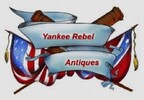 Loading... Please wait...
Loading... Please wait...-
Call us on (973) 810-2976
- My Account
- Gift Certificates
- Items / $0.00
All prices are in All prices are in USD
Categories
- Home
- Sold, Hold, Layaway items
- Civil War medical canteen dated 1857, from Shields Museum Gettysburg (ON HOLD,DP)
Civil War medical canteen dated 1857, from Shields Museum Gettysburg (ON HOLD,DP)
Out of Stock
Product Description
This is another nice piece being offered; it is a Civil War Medical Canteen. It is curve-shaped and measures 13 ½” x 8 ¼”. It is made of tin and has a brass screw-cap with “PATD. JUNE. 2. 57. OCT. 27. 57”, these were the two patent dates in 1857. The purpose of this type of canteen was like an early hot water bottle, it would be placed on a soldier’s stomach to help with abdominal discomfort. This canteen was on display for many years in the Shields Gettysburg Museum.
Diarrhea, dysentery, typhoid fever, and food poisoning with bacteria, such as Salmonella, are direct consequences of unsanitary practices. For those spared childhood infections or those associated with poor hygiene, malaria could be counted on to cause dangerous fevers and liver disease whenever stagnant water abounded.
The deadliest issue that faced the Civil War soldier was disease. For every soldier who died in battle, two died of disease. In particular, intestinal complaints such as dysentery and diarrhea claimed many lives. In fact, diarrhea and dysentery alone claimed more men than did battle wounds.
In 1918, Ott Shields opened a private museum that featured the “Shields Collection” - one of the few documented Gettysburg collections, obtained by local families (Rosensteel, Danner; Wert, Ziegler, etc.). The museum stood along Route 30 just west of downtown Gettysburg and housed a large collection of artifacts related to the battle (see pictures).
The Shields Museum closed in the 1980s and the collection was sold at auction on November 16, 1985. Offering over 600 lots “comprised mostly of Gettysburg battlefield pick-up relics,” the auction attracted several hundred Civil War collectors, dealers, and museum buyers. This canteen still has the original signature twine that Ott used for hanging many of his displays.
In my book “The Civil War Canteen – Third Edition” (see pictures), I show and discuss examples of medical canteens. It is in solid condition with no rust but some period soldered repairs. This would make a great addition to a Civil War Medical collection or a Civil War Gettysburg collection.



